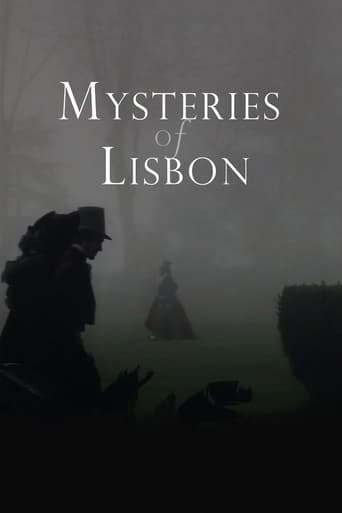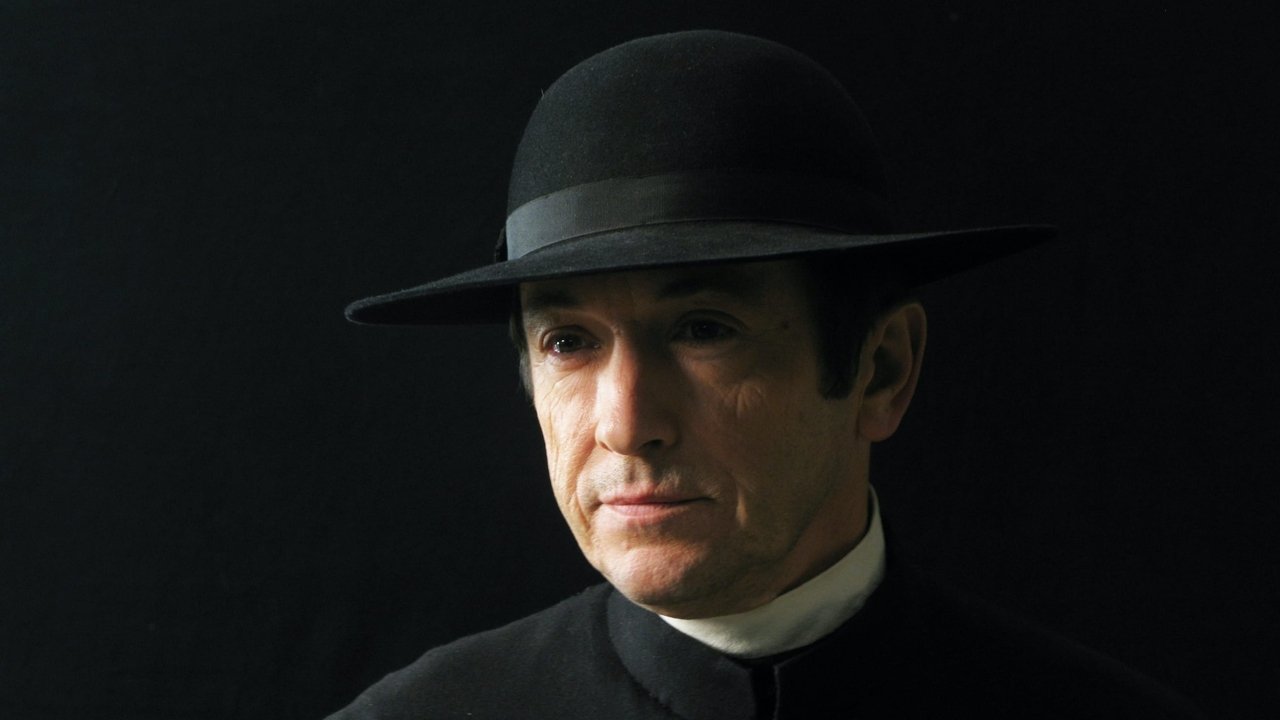saig mutallimov
Stylish and atmospheric costume drama.The action takes us to Lisbon in the 19th century, where the fates, life and stories of several people are intertwined.We have see the film of the cult Chilean director Raul Ruiz, who entire of conscious life make many author movies, for connoisseurs and aesthetes, with hidden meaning, filled with surreal and absurd images, but in his old age decided to aim at the adaptation of the historical adventure novel Castelo Branco, called Portuguese Balzac .The film's action develops slowly and thoroughly, gradually dragging you into this whirlpool consisting of secrets, intrigues and fateful coincidences, adventures, violent passions, terrible revenge and insane love. And so minute by minute there is a complete immersion in the picture, because the secrets are always intriguing ...It should be noted that the action in the film develops over several decades and covers a large number of characters and peoples (almost like G. G. Marquez), where almost every character has its own confusing story and secret, hidden very far away, which we will be told and revealed in the course of the film, hence the actual length of the film, divided into two parts.I highly recommend to view. 9 out of 10.
Andrew Sidhom (Roonil_Wazlib_97)
In the face of fate, a difficult situation, a heavy blow, a lack of identity, or an identity at the mercy of revelations coming to light at fatalistic moments... the characters of Mysteries of Lisbon constantly seek to assert themselves, reinvent themselves, forge an identity. Padre Denis's father goes to priesthood after his loved one dies in childbirth. She had gone on the run with him in light of being an uncared-for wife. Padre Denis, being a bastard child, assumes a number of personas through the years. Joao, similarly, seeks an identity, at first by looking for his parents, then as a young adult by declaring himself the protector of the girl he falls in love with. The latter declares that sad events in her past have made her the nasty person that she is (which Joao, in his crush, cannot see). Joao's mother Angela goes from an unhappy marriage... to her son but in poverty... to the convent. Knife-Eater goes from a man with a heavy conscience to a noble nouveau-riche.In the end, Joao, confused by being a pawn in fate's and other people's dictates tries to leave without a trace, to either check out of life in a way or to reinvent himself somewhere far away. But his benefactors know how to find him. And he cannot turn his back on the past completely; he writes his story, not forgetting where he comes from. A fitting conclusion to a film also in part about storytelling. After hours of listening to people telling their stories, he finally decides to tell his.
RMHolt77
MYSTERIES OF LISBON is a staggeringly immense epic, weaving together multiple narratives of operatic passion and desire into a broader memory-narrative patchwork. The late Raul Ruiz draws upon great predecessors to set the visual tone (there's plenty of Visconti's THE LEOPARD and Kubrick's BARRY LYNDON here), but then toys with the aesthetic by adding playfully surreal touches, so that the events seem perched on the edge of a dream. By design, it's all a bit messy, one narrative tumbling into the other, but Ruiz displays such complete mastery of the medium that MYSTERIES OF LISBON remains gripping, even over the course of its four-hour running time.The word "masterpiece" is fairly overused, and as a result, devalued, but MYSTERIES OF LISBON is the real thing.
Eumenides_0
Mysteries of Lisbon, based on the novel of Romantic Portuguese novelist Camilo Castelo Branco, is a movie full of secrets, implausible coincidences, odd, mysterious characters, revenges, and strange family relationships. It's a modern movie whose story, with its byzantine plot, twists and melodramatic revelations, has a distinctive 19th century taste. It's the story of a bastard orphan called João and his search for the truth about his birth, and of the countless people whose stories must be told in order to understand his life and his future. Recently I finished reading a novel by Carlos Fuentes, Terra Nostra, where it's written that it takes several lives to create a personality. I couldn't think of a better statement to encapsulate this movie's essence.Our protagonist (João Arrais) is an orphan without family name living in a religious school, under the care of the good and protective Father Dinis (Adriano Luz). The other kids pick on him because of his low condition; one day he gets badly beaten in a fight; in bed he's visited, during a feverish sleep, by a woman (Maria João Bastos) who calls him son. And so begins the journey into his past.The movie is a beautiful labyrinth of stories within stories within stories. To understand the story of our protagonist, one must first watch the stories of several other people: his poor father (João Baptista) who dared to fall in love with a noblewoman; his mother, trapped in a loveless marriage; the henchman (Ricardo Pereira) assigned to assassinate him at birth; and the priest that saved his life. I haven't seen a movie so obsessed with the act of telling stories since Wojciech Has' The Saragossa Manuscript, another great movie about stories within stories and multiple narrators.Mysteries of Lisbon, which lasts four and a half hours without ever becoming dull, is divided in two parts: the first deals with João's past; the second deals with his future, and possible death. In perfect symmetry with the first half, the second multiplies itself in stories, taking us to Italy and Paris, and getting entangled in the Napoleonic Wars. As much a story about origins, the movie is about how João grows to become a gentleman called Pedro da Silva (a role played José Afonso Pimentel) and how he falls in love with a ruined Frenchwoman (Clotilde Hesme) whose honor has been sullied by, irony of ironies, the man the protagonist owes his life to. From this insane tapestry of love, manipulation and the lost illusions of youth, Raoul Ruiz and screenwriter Carlos Saboga create an unpredictable finale for the life of our protagonist.The actors are all excellent. The cast is so vast I can't compliment everyone here, but Adriano Luz, Maria João Bastos, Ricardo Pereira, Clotilde Hesme and José Afonso Pimentel deserve special mention. Luz in particular steals every scene. Although the movie is about João, Father Dinis, the mysterious priest who's lived several lives before receiving his holy vows, almost becomes the protagonist at times, and just as well because every scene with him is delightful, thanks to his serenity; he gets so earnestly into the character of a holy man who's removed himself from the world, that I don't think he ever raises his voice above a whisper throughout the movie. He's disappearance from the second part is sadly noticed.Looking at this movie is also a joy. A lot of attention went into the historical recreation of 19th century Portugal, and Ruiz and his crew must have chosen some of Portugal's most beautiful palaces, villas, mansions, convents, churches, ballrooms and woods to film in. Adding to the scenic beauty there's also the cinematography by André Szankowski, who films the movie with a restrained palette of colors: mostly green, brown and golden. There's also a constant game of shadows and light, suitable for a movie about secrets. Many of the tricks recall the work of Roger Deakins, for instance in the way exterior light subtly darkens for a few seconds in a scene. The result is a world of penumbras and silhouettes, of men and women constantly revealed and covered by shadows.And what to say of the long takes? Like the movie that seems endless, the scenes continue for longer than we expect, without cuts, for several minutes. The movie is indeed a collection of long takes. And each is uniquely filmed. Ruiz' steady camera refuses to stay put and follows the characters in and out of rooms, up and down stairs; it films them from high and low angles, from close and long distances; it moves around them, giving the film a fluidity seldom seen in this age of quick cuts and shaky cams.Raoul Ruiz directed Mysteries of Lisbon knowing that it could be his last movie. During shooting he underwent a surgery to treat his liver cancer. That he managed to complete this movie with a fragile health is a testament to his strength. That he managed to create one of the best and most beautiful movies of 2010 during one of the worst periods of his life, that's a testament to his talent as one of the greatest living directors.


 AD
AD




